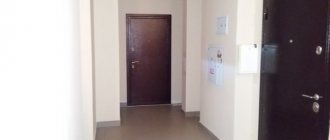Modern new buildings provide three types of parking: underground, above-ground (usually multi-level) and open. They differ greatly in terms of comfort and cost. In the article we will talk about the first type - parking spaces in underground parking. Let's consider the nuances of choice, the cost of a parking space and monthly payments, and also compare the purchase of a parking space with rent.
Do you want to profitably buy an apartment in a new building with parking? With Avakho, choosing a new building in Moscow and the region is easy. Free consultation and individual selection of apartments.
We are constantly expanding our database of residential complexes. You can view the current list of new buildings in our listing.
Which new buildings have underground parking?
The presence of underground parking is a sign of the class of housing. As a rule, it is provided in new buildings ranging from comfort class and above. There are also examples of underground parking in economy class residential complexes, but they are few. Ideally, the number of parking spaces tends to match the number of apartments. But in comfort and business class there are still fewer of them than apartments. It happens even two or three times. Only in elite projects you will find parking spaces equal to the number of apartments or more: including two cars per apartment.
Reasons for the low demand for parking spaces
Due to the high cost of space, sometimes up to 75% of the space in parking lots is empty.
Despite the constantly growing vehicle fleet, the occupancy rate of parking lots in new residential complexes is low. This applies primarily to houses in the mass segment. According to experts, about half of the parking spaces in comfort-class rental houses remain unclaimed. In economy class projects this figure is even higher – up to 75% of the space is empty. Only in elite complexes and business-class buildings there are no problems with the sale of parking spaces - here they are dismantled at an early stage.
At first glance, the situation is paradoxical, but quite understandable. Construction of parking lots is expensive for developers. Even in economy class, the cost of parking spaces starts from 250 thousand rubles and can reach 1 million rubles. For people buying housing in the lower price segment, such an amount, as they say, “is not lying around.” They would rather spend money on improving their living conditions than buy a parking space.
Given this state of affairs, there is no need to talk about the profitability of parking lots. There is no demand for them and companies are forced to sell parking spaces at cost. Developers believe that they need to take a more balanced approach to the construction of parking lots, because the funds spent on them will still be included in the cost of the apartments.
What are the features of underground parking?
Parking spaces in underground parking are associated with real comfort. Modern parking lots are equipped with fire and security alarm systems, access control and video surveillance, lighting, fire ventilation and a number of other technical requirements.
Underground parking may consist of several levels. In high-rise projects there are usually two or three. These levels provide everything that an underground parking so attracts: a car wash, tire service, and a tire inflation system. Some projects provide space for electric cars and motorcycles, family parking spaces and parking spaces with a car lift that allows you to place two cars on top of each other.
Uninvited guests will not be allowed into the underground parking: access is controlled using a license plate reading system, personal access cards or key fobs. The underground parking may provide guest parking spaces. Only those guests for whom the residents have issued a pass will be allowed in.
In most new buildings, you can go down to the underground parking by elevator. It is guarded and has video surveillance. Imagine, it’s winter outside, and you go down to the warm -1st floor, without cleaning or heating your car. Just get in and drive. Bonus: in the evening you won’t have to look for a parking space in a crowded parking lot near your house or even abandon your car somewhere in the distance.
In cold weather, the air temperature in the underground parking lot is at least +5° C.
How much time can you spend in winter cleaning and heating your car? Let's say 15-20 minutes in the morning. It may take 15 or 30 minutes, or even more, to park your car. We believe that in winter, having a parking space in the underground parking lot can save at least 30 minutes of free time per day. I don’t think it’s worth saying that you can definitely figure out what’s best to spend it on.
Types of parking
Surface parking in the courtyard of the residential complex
Surface flat parking. The simplest and cheapest type of parking. It is because of this that the courtyards of many new buildings of the 2000s turned into parking lots without greenery and normal sidewalks. Today, developers, on the contrary, are trying to free yards from cars. In addition, surface parking lots use land inefficiently—they take up a lot of space and can accommodate few cars. Because of this, such parking lots are practically not built in modern residential complexes.
Price of a parking space: free Pros: cheap Cons: do not protect the car from bad weather, spoil the environment, take up space in the yard
Multi-storey ground parking
Surface multi-level parking lots . The most common option in mass market projects. Buildings with several floors can accommodate hundreds of cars. Parking lots are equipped with various entry and exit systems, elevators, lifts, vacancy tracking programs, video surveillance, and so on. Sports fields or recreation areas are sometimes placed on the roof of such a building.
Pros: Cheap. Cars are protected from rain and snow. The yard is free of cars. Relatively cheap. Cons: It may be quite far from home, you will have to walk. They are not always heated, which means they will not protect the car from frost. Price: from 250 to 800 thousand rubles
Underground Parking
Underground multi-level parking. This type is most often built in business and elite class residential complexes. The deeper such a parking lot, the more expensive it costs the developer. Accordingly, a place in such a parking lot will hit the buyer’s wallet harder. But this parking lot is heated and guarantees complete safety of the car.
Pros: The car is completely protected from cold and bad weather. In winter, you don’t need to warm it up before going outside. A parking lot is being built next to the house. Sometimes residents can get to the apartment directly from the parking lot by elevator. Cons: high cost of a parking space Price: from 600 thousand to 3 million rubles
Take care of purchasing a parking space in advance so as not to spoil the yard and your own mood every morning.
Parking lots are not particularly popular among residents. Thus, in the mass market, only 20 places per 100 apartments are in demand. Other residents prefer to leave their cars in the yard near the house. In business class, parking spaces are being purchased more actively - up to 70% of the spaces are usually purchased.
Developers are doing their best to attract buyers' attention to parking lots. Provides serious discounts on parking spaces, sells them together with apartments and even as a mortgage. However, residents often hope for Russian luck, and then park the car right in the yard on the lawn or sidewalk. These same people subsequently complain about problems with leaving their yards and traffic jams inside the residential complex. Do not do it this way!
How much do parking spaces cost?
Cost of parking spaces
in underground parking directly depends on the class of the project and the stage of its readiness. As a rule, the start of sales of parking spaces does not begin with the foundation pit. Typically, the developer holds back parking spaces, fueling interest from residents. And at the moment when parking sales open, the best offers usually “fly away” very quickly.
In projects where there are a lot of unsold parking spaces, two or three years after delivery, a parking space may be offered as a gift when purchasing apartments of a certain size.
Let's get back to the numbers.
Outside the Moscow Ring Road, a parking space can be purchased from 400 thousand rubles. In Moscow, from 800 thousand rubles to 4.5 million rubles in the comfort and business class segments. In elite complexes, according to the Metrium real estate agency, the average cost of a parking space in an underground parking lot can reach 6 million rubles and more.
Pricing depends on the location of the parking space in the parking lot and its size. Usually the most expensive places are located on the -1st floor of the parking lot (if it is multi-level), next to the elevator, away from garbage containers.
Real story:
in one Moscow comfort-class project, parking spaces were put on sale almost two years after the start of apartment sales. First, “for our own” by mail and instant messengers, without announcement on the website. Owners who submitted a request for parking received a parking plan and the cost of parking spaces marked “available/reserved” in an excel file. With apartment prices starting from 209 thousand rubles/m², the price for the most budget single parking space of 13.25 m² was 1.2 million rubles, for family ones from 30 m² - from 2 million rubles.
The reservation for a parking space was valid for only a day; one parking space was allocated per person; if more were needed, family spaces were offered for purchase. There were no discounts on parking, and not the entire pool of spaces was released for sale. According to the manager: “The next batch of parking spaces will be removed from the reserve after a significant price increase.” Purchases were made only with 100% payment. Most of the parking spaces were sold out in 2-3 days.
In 90% of cases, a parking space can be purchased with a mortgage: there are programs both without restrictions and for purchase only in partner projects simultaneously with the purchase of apartments. But in practice, the most profitable parking spaces may not receive bank approval.
The legal nature of parking spaces in apartment buildings is a false certainty
Housing Code of the Russian Federation When creating parking spaces for disabled people, Art. 36 overlaps Art. 1, paragraph 3. The consent of the residents is not required. And most importantly, it is necessary to determine the ownership of the land plot; usually the owners of an apartment building own only the land plot located directly under the house itself. The adjacent courtyard area is under the jurisdiction and disposal of the Municipal Authority. and not residents of an apartment building, HOUSING CODE OF THE RUSSIAN FEDERATION
Adopted by the State Duma on December 22, 2004
Approved by the Federation Council on December 24, 2004
Section I. GENERAL PROVISIONS
Chapter 1. BASIC PROVISIONS. HOUSING LEGISLATION
Article 1. Basic principles of housing legislation
1. …. 3. Housing rights may be limited on the basis of federal law and only to the extent necessary in order to protect the foundations of the constitutional system, morality, HEALTH, the rights and legitimate interests of other persons, ensuring the defense of the country and the security of the state. ————-
The creation of parking spaces is the responsibility of the Municipal Authorities: -
— Article 21. Traffic management measures
1. Measures to organize road traffic, including the creation and maintenance of the functioning of parking lots (parking spaces) within the boundaries of populated areas, are carried out in order to increase road safety and road capacity by federal executive authorities, executive authorities of constituent entities of the Russian Federation and local governments, legal entities and individuals who are owners or other owners of highways. Parking lots (parking spaces) within the boundaries of populated areas are created and used in the manner established by Federal Law No. 257-FZ of November 8, 2007 “On highways and road activities in the Russian Federation and on amendments to certain legislative acts of the Russian Federation.” (as amended by Federal Law dated April 21, 2011 N 69-FZ) 2. The development and implementation of these activities are carried out in accordance with the regulatory legal acts of the Russian Federation and regulatory legal acts of the constituent entities of the Russian Federation on the basis of projects, diagrams and other documentation approved in the established ok.
Further see: - Changes and additions made to the legislative acts of the Russian Federation on parking lots (packing spaces): -
RUSSIAN FEDERATION
THE FEDERAL LAW
ON AMENDMENTS TO SPECIFIC LEGISLATIVE ACTS OF THE RUSSIAN FEDERATION
Adopted by the State Duma on April 11, 2011
Approved by the Federation Council on April 13, 2011
Article 1
Make the following changes to the Federal Law of December 10, 1995 N 196-FZ “On Road Traffic Safety” (Collection of Legislation of the Russian Federation, 1995, N 50, Art. 4873): 1) Article 14 should be stated as follows:
“Article 14. Temporary restrictions or cessation of the movement of vehicles on roads
Temporary restrictions or cessation of the movement of vehicles on highways of federal, regional or intermunicipal, local significance are carried out, respectively, by the federal executive body performing the functions of providing public services and managing state property in the field of road infrastructure, the authorized executive body of the constituent entity of the Russian Federation, the local body self-government in accordance with the Federal Law of November 8, 2007 N 257-FZ “On highways and road activities in the Russian Federation and on amendments to certain legislative acts of the Russian Federation.”;
2) paragraph 1 of Article 21 shall be stated as follows: “1. Measures to organize road traffic, including the creation and maintenance of the functioning of parking lots (parking spaces) within the boundaries of populated areas, are carried out in order to increase road safety and road capacity by federal executive authorities, executive authorities of constituent entities of the Russian Federation and local government bodies, legal and individuals who are owners or other owners of highways. Parking lots (parking spaces) within the boundaries of populated areas are created and used in the manner established by Federal Law No. 257-FZ of November 8, 2007 “On highways and road activities in the Russian Federation and on amendments to certain legislative acts of the Russian Federation.” "
Article 2
Subparagraph 11 of paragraph 2 of Article 26.3 of the Federal Law of October 6, 1999 N 184-FZ “On the general principles of organization of legislative (representative) and executive bodies of state power of the constituent entities of the Russian Federation” (Collected Legislation of the Russian Federation, 1999, N 42, Art. 5005; 2003, N 27, article 2709; 2005, N 1, article 17, 25; 2006, N 1, article 10; N 23, article 2380; N 30, article 3287; N 31, article 3452; N 44, Art. 4537; N 50, Art. 5279; 2007, N 1, Art. 21; N 13, Art. 1464; N 21, Art. 2455; N 30, Art. 3747, 3805, 3808; N 43 , Art. 5084; N 46, Art. 5553; 2008, N 29, Art. 3418; N 30, Art. 3613, 3616; N 48, Art. 5516; N 52, Art. 6236; 2009, N 48, Art. 5711; N 51, Art. 6163; 2010, N 15, Art. 1736; N 31, Art. 4160; N 41, Art. 5190; N 46, Art. 5918; N 47, Art. 6030, 6031; N 49, Article 6409; N 52, Article 6984) add the words “including the creation and operation of parking lots (parking spaces) provided on a paid basis or without charging a fee.”
Article 3
…
Article 4
Introduce into the Federal Law of October 6, 2003 N 131-FZ “On the general principles of organizing local self-government in the Russian Federation” (Collected Legislation of the Russian Federation, 2003, N 40, Art. 3822; 2005, N 1, Art. 17, 25; 2006, N 1, Art. 10; N 23, Art. 2380; N 30, Art. 3296; N 31, Art. 3452; N 43, Art. 4412; N 50, Art. 5279; 2007, N 1, Art. 21; N 21, Art. 2455; N 25, Art. 2977; N 43, Art. 5084; N 46, Art. 5553; 2008, N 48, Art. 5517; N 52, Art. 6236; 2009, N 52, Art. 6441; 2010, N 15, Art. 1736; N 49, Art. 6409) the following changes: 1) paragraph 5 of part 1 of Article 14 after the words “within the boundaries of settlements”, add the words “, including the creation and provision functioning of parking lots (parking spaces)"; 2) paragraph 5 of part 1 of Article 16 after the words “urban district” should be supplemented with the words “including the creation and operation of parking lots (parking spaces).”
Article 5
Introduce into the Town Planning Code of the Russian Federation (Collected Legislation of the Russian Federation, 2005, No. 1, Art. 16; 2006, No. 1, Art. 21; 2008, No. 29, Art. 3418; No. 30, Art. 3604; 2011, No. 13 , Art. 1688) the following changes: 1) Article 1 is supplemented with paragraph 21 as follows: “21) parking (parking space) - a specially designated and, if necessary, arranged and equipped place, which is also part of a highway and (or) adjacent to roadway and (or) sidewalk, shoulder, overpass or bridge, or which is part of overpass or under-bridge spaces, squares and other objects of the road network, buildings, structures or structures and intended for organized parking of vehicles on a paid basis or without charging a fee decision of the owner or other owner of the highway, the owner of the land plot or the owner of the corresponding part of the building, structure or structure.”; 2) paragraph 3 of part 5 of Article 42, after the words “street and road network”, add the words “which may include a layout of parking lots (parking spaces).”
Article 6
Amend Federal Law No. 257-FZ of November 8, 2007 “On highways and road activities in the Russian Federation and on amendments to certain legislative acts of the Russian Federation” (Collected Legislation of the Russian Federation, 2007, No. 46, Art. 5553; 2008, No. 30, Article 3616; 2009, No. 29, Article 3582; 2010, No. 45, Article 5753) the following changes: 1) paragraph 5 of Article 3, after the word “parking”, add the word “(parking)”; 2) in Article 12: a) add clause 3.1 with the following content: “3.1) making decisions on the creation and use on a paid basis of parking lots (parking spaces) located on public roads of regional or intermunicipal importance, and on the termination of such use; "; b) add clause 3.2 with the following content: “3.2) establishing the procedure for the creation and use, including on a paid basis, of parking lots (parking spaces) located on public roads of regional or intermunicipal importance;”; c) add clause 3.3 with the following content: “3.3) establishing the amount of fees for the use on a paid basis of parking lots (parking spaces) located on public roads of regional or intermunicipal importance;”; d) paragraph 4 should be supplemented with the words “for the use on a paid basis of parking lots (parking spaces) located on public roads of regional or intermunicipal importance”; 3) in Article 13: a) add clause 3.1 with the following content: “3.1) making decisions on the creation and use on a paid basis of parking lots (parking spaces) located on public roads of local importance, and on the termination of such use;”; b) add clause 3.2 with the following content: “3.2) establishing the procedure for the creation and use, including on a paid basis, of parking lots (parking spaces) located on public roads of local importance;”; c) add clause 3.3 with the following content: “3.3) establishing the amount of fees for the use on a paid basis of parking lots (parking spaces) located on public roads of local importance;”; d) paragraph 4 should be supplemented with the words “for the use of paid parking lots (parking spaces) located on public roads of local importance”; 4) Part 1 of Article 17 should be stated as follows: ...
Article 7
….
REFERENT: Parts 23 and 24 of Article 9 of this Federal Law come into force on January 1, 2015 (Article 10).
Article 10
1. This Federal Law comes into force ten days after the day of its official publication, with the exception of provisions for which this article establishes a different date for their entry into force. 2. Parts 1 - 22 of Article 9 of this Federal Law come into force on September 1, 2011. 3. Paragraphs 1 - 9, 14 - 16, 18 - 21 of Article 3 of this Federal Law come into force on January 1, 2012. 4. Paragraphs 10 - 13 and 17 of Article 3 of this Federal Law come into force on July 1, 2012. 5. Parts 23 and 24 of Article 9 of this Federal Law come into force on January 1, 2015.
President of the Russian Federation D. MEDVEDEV
Moscow, Kremlin April 21, 2011 N 69-FZ
+7 About the company - Rules - Prices - Cooperation - Partners Facebook - VKontakte - Twitter - Livejournal © 2014 Legal system "Referent"
I also ask you to take into account that since January 1, 2005, motor vehicles or compensation for them in the amount of 100 thousand rubles have been excluded from the list of rehabilitation means. The technical service life of a vehicle received under social protection is 7 years, i.e. for the period of 2012, the service life of these vehicles has expired and cannot be replaced. As a result of exclusion from the list from 01.01.2005, the means of rehabilitation of a car is a motor vehicle and the recommendation for rehabilitation in the form of a motor vehicle in the IPR of a disabled person is excluded, but in accordance with the Resolution of the Council of Ministers - Government of the Russian Federation of October 23, 1993 N 1090 “On traffic rules” in the current edition, the signs P - DISABLED are valid and apply to disabled people of 1st and 2nd grades. without exceptions or reservations. The authorities’ reference, refusal due to the wording “Disabled due to a GENERAL illness” has no legal basis, since until 01/01/2005, according to the Federal Law. RF 181 On the protection of the rights of disabled people, REGULATIONS ON THE PROCEDURE FOR PROVIDING DISABLED PEOPLE WITH MOTOR VEHICLES, Orders of the Committees on Labor and Social Protection of the Population of the Administration of Regional Districts On the procedure for providing disabled people with motor vehicles, made as a carbon copy, I give as an example: - Order of the Committee on Labor and social protection of the population of the Administration of St. Petersburg dated June 10, 2003 N 11-r On the procedure for providing disabled people with vehicles. REGULATIONS ON THE PROCEDURE FOR PROVIDING DISABLED PEOPLE WITH MOTOR VEHICLES:- 3. Providing disabled people with motor transport on preferential terms
3.1. In accordance with Article 30 of the Federal Law “On Social Protection of Disabled Persons in the Russian Federation”, the following have the right to receive a motor vehicle free of charge or on preferential terms if there are medical indications: - disabled people due to GENERAL DISEASE; - disabled since childhood; — disabled people due to work injury; - disabled children who have reached the age of five and suffer from dysfunction of the musculoskeletal system, with the right to drive these vehicles by adult family members.
Further: - According to the Land Code of the Russian Federation, a vacant land plot that is not in the possession, order, alienation of another legal entity, individual, other than the state, is provided to disabled people without competition, on a free basis. All procedures for registering this land plot for individual housing construction, gardening, agriculture, as well as for a parking lot, construction of a garage for the disabled are carried out at the expense of the state.
I warn you: - power structures, state bodies. the authorities, the prosecutor's office, the courts, in every possible way interfere with the legal execution of these rights for people with disabilities. There are laws and rights, but there is no enforcement of laws or rights! Including, in this case, the Constitution of the Russian Federation, Article 1, Article 2 is violated: - CONSTITUTION OF THE RF
Section one. Basic provisions Chapter 1. Fundamentals of the constitutional system Article 1 1. Russian Federation - Russia is a democratic federal legal state with a republican form of government. 2. The names Russian Federation and Russia are equivalent. Article 2 Man, his RIGHTS and freedoms are the highest value. RECOGNITION, OBSERVATION and PROTECTION of human and CITIZEN RIGHTS and FREEDOMS IS THE RESPONSIBILITY OF THE STATE.
I wish you success in this confrontation!!!
Maybe it's better to rent?
Many residents of new buildings are considering renting parking spaces. They can be rented out by the owners and management company if there are unsold lots. According to the Metrium real estate agency, the cost of a parking space, depending on the location and class of the new building, can vary from 3,000 to 20,000 rubles per month.
Here are examples of current prices for parking spaces in underground parking from owners and agents:
| new building | location | Class | square | cost per month |
| Mercury City | Moscow, Presnensky | elite | 16 m² | 35 000 ₽ |
| Wine House | Moscow, Zamoskvorechye | elite | 14 m² | 20 000 ₽ |
| Wellton park | Moscow, Khoroshevo-Mnevniki | comfort/business | 20 m² | 15 000 ₽ |
| Fili Grad | Moscow, Filevsky Park | business | 15 m² | 12 000 ₽ |
| Seliger City | Moscow, Western Degunino | comfort | 17 m² | 7 500 ₽ |
| Heritage | Moscow, Preobrazhenskoye | business | 15 m² | 5 000 ₽ |
| Prima Park | NAO, Shcherbinka | economy/comfort | 17 m² | 6 000 ₽ |
| Lighthouse | Moscow Region, Khimki | comfort | 15 m² | 6 500 ₽ |
| ART | Moscow Region, Krasnogorsk | comfort/business | 15 m² | 6 000 ₽ |
| Novokosino-2 | Moscow Region, Reutov | economy/comfort | 16 m² | 5 000 ₽ |
Thus, per year it will cost 96,000 rubles to rent a parking lot in a comfort class project at a rate of 8,000 rubles. The parking spaces themselves, through rental, will pay for themselves in 10 years or longer, depending on their cost. The calculations do not take into account utility costs.
conclusions
Guided by such payback analytics, a number of experts consider the purchase of a parking space in an underground parking lot to be an unprofitable investment. But on the other side of the scale, the non-analytical one, is the daily comfort that comes with purchasing a parking space.
Buying an underground parking space is worth thinking about when buying a long-term home. By purchasing a parking space, you will not depend on open street parking and landlords and will be able to spend the “carved out” half an hour on something more pleasant.








